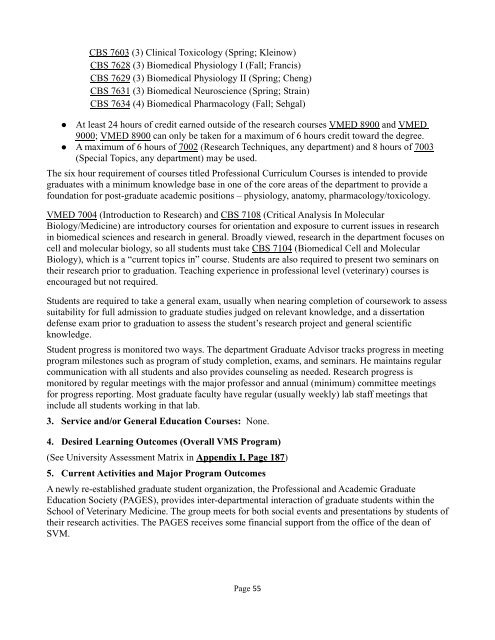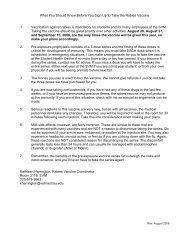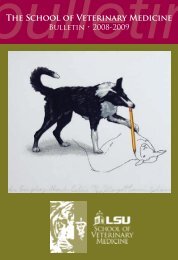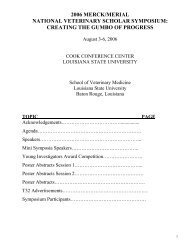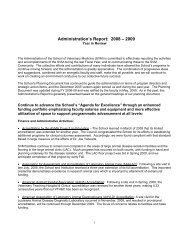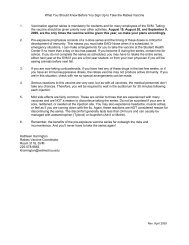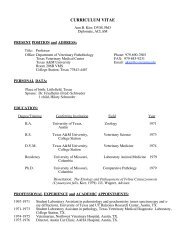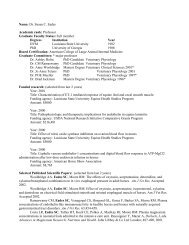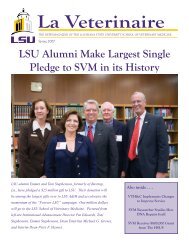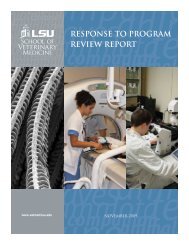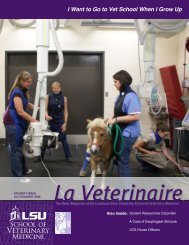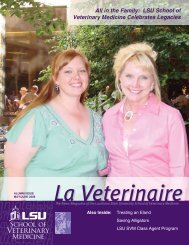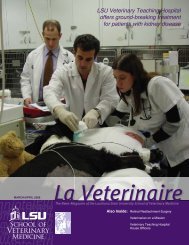Self Study, Program Review 2009 - School of Veterinary Medicine ...
Self Study, Program Review 2009 - School of Veterinary Medicine ...
Self Study, Program Review 2009 - School of Veterinary Medicine ...
Create successful ePaper yourself
Turn your PDF publications into a flip-book with our unique Google optimized e-Paper software.
CBS 7603 (3) Clinical Toxicology (Spring; Kleinow)CBS 7628 (3) Biomedical Physiology I (Fall; Francis)CBS 7629 (3) Biomedical Physiology II (Spring; Cheng)CBS 7631 (3) Biomedical Neuroscience (Spring; Strain)CBS 7634 (4) Biomedical Pharmacology (Fall; Sehgal)• At least 24 hours <strong>of</strong> credit earned outside <strong>of</strong> the research courses VMED 8900 and VMED9000; VMED 8900 can only be taken for a maximum <strong>of</strong> 6 hours credit toward the degree.• A maximum <strong>of</strong> 6 hours <strong>of</strong> 7002 (Research Techniques, any department) and 8 hours <strong>of</strong> 7003(Special Topics, any department) may be used.The six hour requirement <strong>of</strong> courses titled Pr<strong>of</strong>essional Curriculum Courses is intended to providegraduates with a minimum knowledge base in one <strong>of</strong> the core areas <strong>of</strong> the department to provide afoundation for post-graduate academic positions – physiology, anatomy, pharmacology/toxicology.VMED 7004 (Introduction to Research) and CBS 7108 (Critical Analysis In MolecularBiology/<strong>Medicine</strong>) are introductory courses for orientation and exposure to current issues in researchin biomedical sciences and research in general. Broadly viewed, research in the department focuses oncell and molecular biology, so all students must take CBS 7104 (Biomedical Cell and MolecularBiology), which is a “current topics in” course. Students are also required to present two seminars ontheir research prior to graduation. Teaching experience in pr<strong>of</strong>essional level (veterinary) courses isencouraged but not required.Students are required to take a general exam, usually when nearing completion <strong>of</strong> coursework to assesssuitability for full admission to graduate studies judged on relevant knowledge, and a dissertationdefense exam prior to graduation to assess the student’s research project and general scientificknowledge.Student progress is monitored two ways. The department Graduate Advisor tracks progress in meetingprogram milestones such as program <strong>of</strong> study completion, exams, and seminars. He maintains regularcommunication with all students and also provides counseling as needed. Research progress ismonitored by regular meetings with the major pr<strong>of</strong>essor and annual (minimum) committee meetingsfor progress reporting. Most graduate faculty have regular (usually weekly) lab staff meetings thatinclude all students working in that lab.3. Service and/or General Education Courses: None.4. Desired Learning Outcomes (Overall VMS <strong>Program</strong>)(See University Assessment Matrix in Appendix I, Page 187)5. Current Activities and Major <strong>Program</strong> OutcomesA newly re-established graduate student organization, the Pr<strong>of</strong>essional and Academic GraduateEducation Society (PAGES), provides inter-departmental interaction <strong>of</strong> graduate students within the<strong>School</strong> <strong>of</strong> <strong>Veterinary</strong> <strong>Medicine</strong>. The group meets for both social events and presentations by students <strong>of</strong>their research activities. The PAGES receives some financial support from the <strong>of</strong>fice <strong>of</strong> the dean <strong>of</strong>SVM.Page 55


